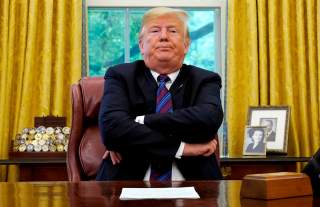America Is Determined to Fight the World
Boosted by its victory in the Cold War, the United States has allowed hubris to dominate its foreign-policy decisionmaking.
Which suggests that Washington should look for accommodation rather than confrontation with Russia. The West risks permanent estrangement for no good policy purpose. The United States can rightly insist that Moscow stay out of American elections, but the former should make a similar pledge regarding foreign contests. Beyond that there surely is potential for a deal: take NATO expansion off the table in return for an end to Russian destabilization of Georgia and Ukraine. Then drop sanctions.
And draw Moscow toward the West. The objective would not be to push Vladimir Putin into war with China, but to eliminate the disagreements which bring Beijing and Moscow together, the perception of a shared threat from America. Then the U.S. would disperse rather accumulate potential adversaries.
Washington’s punitive policies have proved far better at making enemies than friends. American policymakers would do better focusing on practical U.S. security rather than succumbing to abstract moral vanity. Richard Nixon, despite his obvious faults, understood the principle of dividing potential foes. President Donald Trump and those around him should learn from history.
Doug Bandow is a senior fellow at the Cato Institute. A former special assistant to President Ronald Reagan, he is author of Foreign Follies: America’s New Global Empire.

